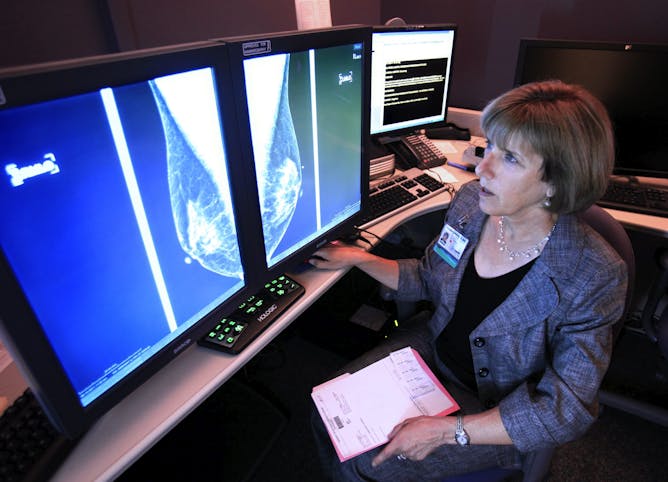|
At the beginning of October, we published a provocative piece about mammography. That article, by Prof. Anne Kearney of Memorial University, made the case "there is no reliable evidence that routine mammograms for healthy women save lives." Today in The Conversation Canada, we present a new article in which the authors argue exactly the opposite. Paula Gordon of the University of British Columbia and Martin Yaffe of the University of Toronto state “there’s overwhelming evidence that earlier detection of breast cancer by mammography screening, combined with modern therapy, reduces deaths from breast cancer markedly.” The one thing the authors of both articles would agree on is that there has been a
debate for years among researchers about various aspects of routine mammography screening. As a reader, what should you do? Dr. Gordon and Prof. Yaffe address that issue: “We believe that women should decide for themselves whether to participate in screening after they have all the facts.”
The terrorist attack in New York on Tuesday will re-open the debate about religion and violence. But Maxwell Kennel of McMaster University puts forward a more informed view: “Violence is something demonstrably found in groups and individuals regardless of whether they’re religious or secular.”
We’ve published many articles about STEM – science, technology, engineering and mathematics. Paul Axelrod of York University says Canadian universities should not marginalize liberal arts and the social sciences as they increase their focus on the STEM programs. “The contribution of liberal arts to cultural and civic life is crucial and historically enduring,” says Prof. Axelrod.
And finally, the House of Commons Standing Committee recently studied whether pornography should be considered a public health issue. Rebecca Sullivan of the University of Calgary and Valerie Webber of Memorial University look at the issue and applaud the committee for deciding there was no credible evidence that porn causes anti-social behaviour.
Regards,
|

Dr. Karen Lindfors, a professor of radiology and chief of breast imaging at the University of California, Davis Medical Center, examines the mammogram of a patient.
(AP Photo/Rich Pedroncelli)
Paula Gordon, University of British Columbia; Martin Yaffe, University of Toronto
The majority of research suggests the benefits of mammography screening greatly outweigh the harms for women over age 40.
|

Is religion inherently violent? Some believe so, but secular individuals and institutions have proven to be just as violent.
(Shutterstock)
Maxwell Kennel, McMaster University
Many think that violence is central to religion, but some scholars argue it's meaningless to single out religion rather than socio-economic factors when assessing violent acts.
|

Navdeep Bains, Canada’s
innovation, science and economic development minister, takes part in a technology event in Ottawa in May 2017. The Canadian government has started up a $1.26-billion fund to support innovation-related business investments.
THE CANADIAN PRESS/Sean Kilpatrick
Paul Axelrod, York University, Canada
If leaders of educational institutions are concerned about the employability of graduates, they should avoid over-investing in STEM subjects and stop snubbing liberal arts.
|

Ovidie is a French feminist who published a book about the ignorance of pornography. Her documentary Pornocracy is an exploration of porn’s multinational corporations and their exploitation of performers.
(Courtesy of Pornocracy)
Rebecca Sullivan, University of Calgary; Valerie Webber, Memorial University of Newfoundland
Both the U.S. and the U.K. have blamed porn for a wide range of medical and social ailments. But a recent Canadian report suggests there's no credible evidence of this co-relation.
|
Politics
|
-
Geoffrey M. Hodgson, University of Hertfordshire
The idea of the Left has been co-opted by Marxism. It originally stood for liberty, rights, democracy and equality under the law.
|
|
Business + Economy
|
-
Brian Walsh, Elon University
Dying in America 200 years ago was a simply family affair, devoid of pomp. The US Civil War and Abraham Lincoln's embrace of embalming changed everything.
|
|
Education
|
-
Harriet Dempsey-Jones, University of Oxford
Some people can see at a finer resolution than the spacing between individual photo-receptors in the eye – and it's all down to their brains.
|
|